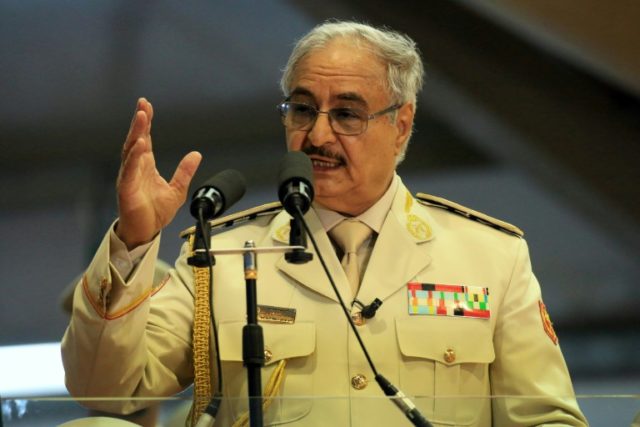Gen. Khalifa Haftar, the head of the breakaway government’s Libyan National Army (LNA), gained control of two-thirds of Libya – including most border crossings and the majority of onshore oil fields – after sweeping through the North African country’s southern region in recent weeks, the Guardian reported on Monday.
The Guardian article came on the same day that the U.N.-brokered Government of National Accord (GNA) based in Tripoli declared a state of emergency in the north-central coastal city of Sirte following reports of LNA forces marching towards the region.
In a statement calling on all fighters loyal to the GNA to duty against Haftar’s forces, the Sirte Protection Force (SPF) affiliated with the U.N.-brokered government declared, “Any attack on the city will mean a declaration of war and its consequences will turn into a disaster.”
Haftar’s army reportedly claimed that their forces advanced on territory near Sirte, but the SPF issued a statement on Sunday denying the allegation, the Libyan Express notes.
The strongman general has surfaced as the top leader of the Tobruk-based breakaway government in eastern Libya making him the top rival of the internationally recognized administration of Prime Minister Fayez al-Sarraj from the GNA.
With the alleged support of neighboring Egypt, Russia, the United Arab Emirates (UAE), and France, Gen. Haftar’s LNA — accused of war crimes by human rights groups — has conquered most of eastern and southern Libya, including the country’s largest oil field.
The Guardian reports:
A major military push south by the Libyan strongman Marshal Khalifa Haftar has left him in the ascendant, and possibly able with international backing to dictate the terms of a future Libyan political settlement, including presidential and parliamentary elections. …The push into the Fezzan region has left Haftar in control of two-thirds of the country, most border crossings and many key oil installations, including the large oil fields in the Murzuk basin.
Haftar’s push into Fezzan — which borders Algeria and Niger — means the strongman general “now controls the majority of Libya’s onshore oil fields,” Peter Millett, the former U.K. ambassador to Libya, indicated to the Guardian.
At the beginning of the month, LNA troops declared that it had captured Libya’s southern border with Algeria, claiming they now control all Libyan borders except one to the west that lies along Tunisia’s international boundary, according to the Libyan Express.
Libya has descended into chaos since the NATO-backed overthrow of dictator Muammar Qaddafi in 2011.
The United States has sporadically targeted Libya-based terrorists with airstrikes. U.S. military officials have expressed concern about Russian support for Gen. Haftar.
On February 27, Russian-allied Haftar and U.S.-back PM Serraj met in Abu Dhabi in what appeared to be a new attempt to end the nearly eight-year-old conflict that has rendered the country a fertile ground for human traffickers and jihadis like the Islamic State (ISIS/ISIL) and al-Qaeda.
Without setting a specific date, the Libyan leaders also agreed to hold democratic elections this year and lift the block on oil production at the al-Sharra field, Libya’s largest field that is now under LNA control.
Last year, both leaders failed to keep their pledge to hold elections by December 2018.
“It remains to be seen whether Haftar is truly committed to a democratic process, or whether, as some fear, he will prepare to take further territory in the west before a final push to Tripoli, the headquarters of resistance to him,” the Guardian notes.
Acknowledging that Libyans fear a showdown between the LNA and Pro-GNA troops, Reuters noted on Monday:
[Gen. Haftar] has not said whether he wants to march on Tripoli, which would dramatically escalate tensions. But his Libyan National Army (LNA) has hinted heavily that it might do so — if Haftar is not recognised as the country’s overall military commander, his aim since he began assembling the force in 2014.
It appears Haftar’ LNA is on the move to seize more territory, undeterred.

COMMENTS
Please let us know if you're having issues with commenting.